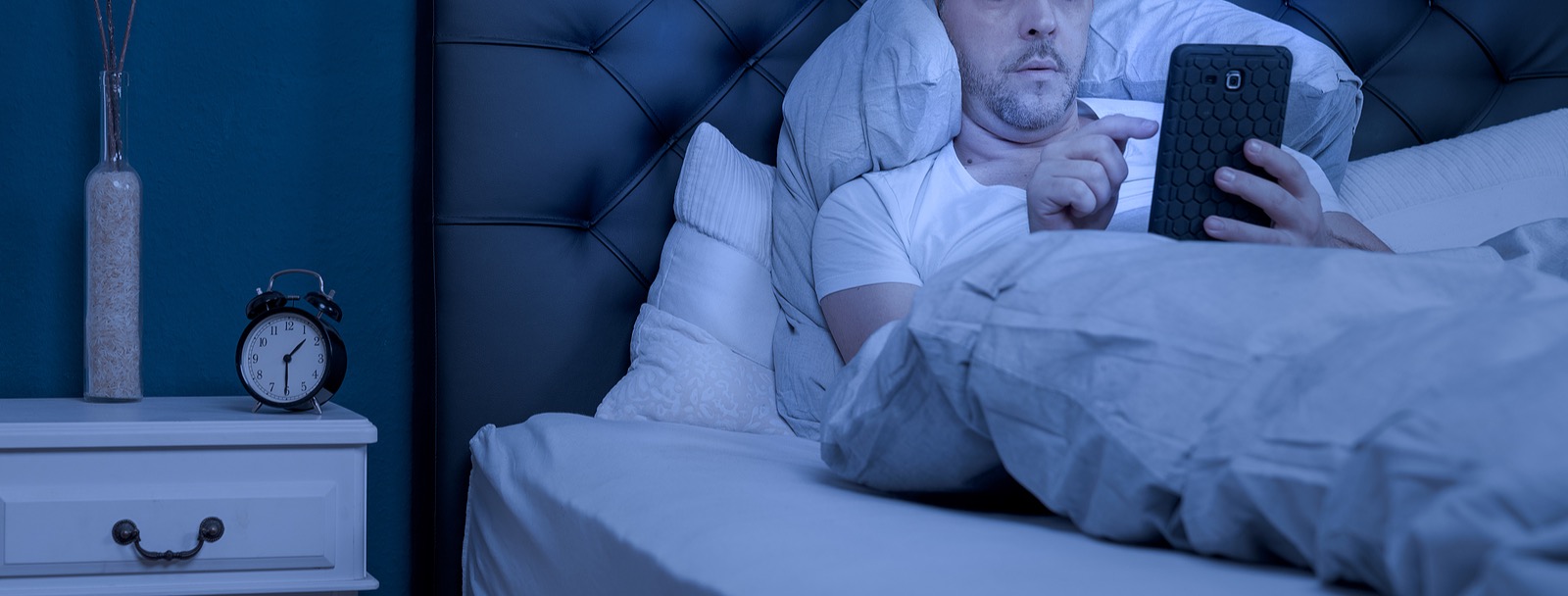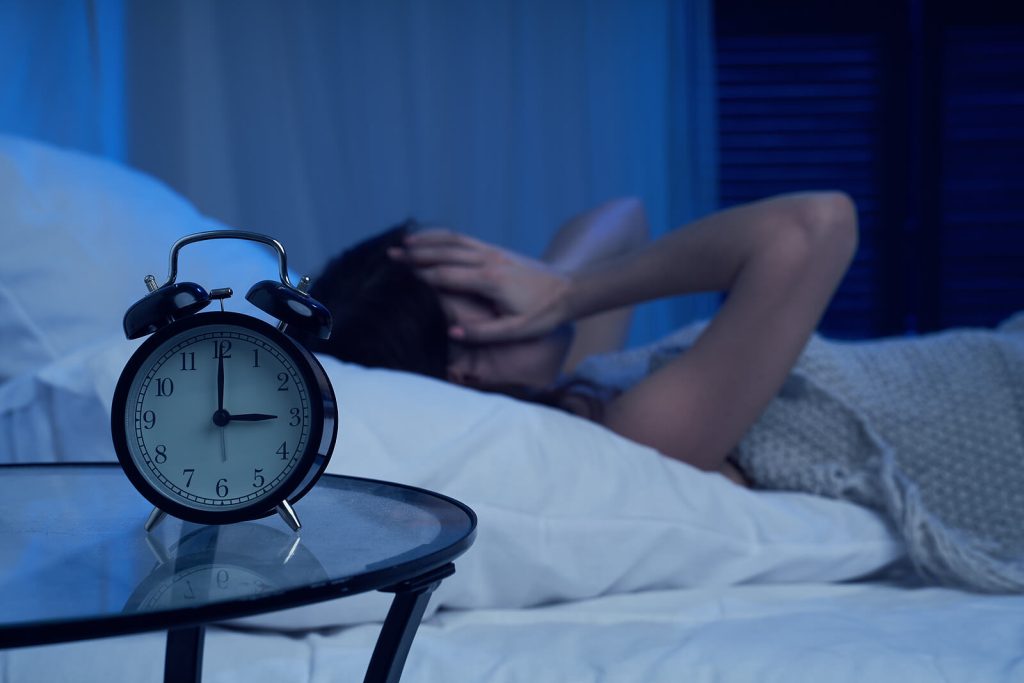Sleep is a basic necessity for all humans. When your sleep cycle is interrupted it can severely impact your daily life and your mental health. A few nights of sleep issues will likely only cause a mild impact on your day. However, chronic periods of sleep deprivation, or insomnia, impact mood, memory, physical health, work/school performance, and overall quality of life.
40 Million Americans Suffer from Chronic Insomnia

What is Insomnia?
Insomnia is a relatively common sleep disorder. If you are experiencing insomnia you may have issues falling asleep, staying asleep, or both. This results in a lack of total sleep or you may not be getting quality sleep.
Types of Insomnia
Transient Insomnia: If sleep issues are present for less than one month, then it is classified as transient insomnia.
Short-term Insomnia:
Sleep issues lasting from one month to 6 months are considered to be dealing with short-term insomnia.
Chronic Insomnia:
People suffering from chronic insomnia have been dealing with sleep issues for at least 6 months.
How Much Sleep Do I Need?
Adults typically require 7 to 9 hours of sleep. This is an ideal number but many people insist they can get by on less sleep. Although they may be able to function on less sleep, they may not be performing at their highest level. Over time, a drop in performance, attention, and memory are likely.
It is estimated that at least 33% of adults do not get enough sleep on a regular basis.
Children and Adolescents are also frequently not getting enough sleep. Children ages 6 to 12 will require 9 to 12 hours of sleep per day. Teenagers should get 9 to 10 hours of sleep each night. Establishing regular sleep patterns has been shown to improve attention, learning, memory, the ability to control emotions, and physical and mental health.

What Causes Insomnia?
Transient Insomnia and Short term Insomnia can be due to a variety of factors:
- Overnight shift work
- Travel and jet lag
- Physical health challenges
- Uncontrolled pain
- Noisy environments
- Temperatures that are uncomfortable- too hot or too cold
- Withdrawal from substances of abuse or prescription medications
Chronic Insomnia presents the most significant challenge for patients. Long-term issues with sleep are usually due to underlying psychiatric or physiologic conditions. At Agave Psychiatry, our team of skilled clinicians seeks to evaluate a variety of underlying issues that may be negatively impacting your sleep.
These underlying issues can include:
- Mood Disorders, including depression: poor sleep quality is frequently associated with changes in mood and it may improve if your depressive symptoms are being adequately treated.
- Anxiety-related conditions: worry, fear, and anxiety are likely severe obstacles to sleeping well. Many people report “I can’t turn my mind off” when attempting to fall asleep. For these individuals, treating the underlying anxiety can have a positive impact on their ability to fall, and stay, asleep.
- Stress: unrelenting stress due to work, school, and interpersonal issues may lead to chronic insomnia. Prior traumatic experiences can also lead to recurring stress that will decrease sleep quality.
5 Sleep Myths
Unfortunately, many sleep myths exist. Here are a few that we would like to clear up:
1) If I don’t sleep enough during the week I can make it up on the weekend.
INCORRECT! Studies have shown that this is not true. The sleep hours that are lost during the week cannot be made up with excess weekend sleeping.
2) If I go to bed late on the weekends I can just sleep in.
INCORRECT! Although this seems reasonable, sleeping in on Saturday and Sunday will potentially impact your ability to fall asleep Sunday evening. This can set people up for a bad start to their week.
3) Teenagers require less sleep as they move into high school.
INCORRECT! Many teens will still require at least 9-10 hours of sleep per night.
4) My body has adjusted to getting less sleep.
INCORRECT! If you are not consistently getting enough sleep then your body isn’t able to spend time in the various phases of sleep. We cycle through different sleep phases throughout the night in order to allow our brain and body to rest and heal.
5) Getting a full night of sleep really isn’t that important.
INCORRECT! A restful night of sleep should be a priority. It is vital for long-term physical and mental health and wellness.

Treating Insomnia
What is Sleep Hygiene?
Sleep hygiene refers to habits and plans that seek to improve your ability to fall, and stay, asleep on a regular basis. Many people with Insomnia do not realize that they are actually doing things that may negatively impact their goal of having a good night’s sleep. The use of sleep hygiene seeks to help people establish a healthy routine to increase their sleep quantity and quality.
Have a Consistent Routine:
Try to follow the same steps each night before bed. This can include brushing your teeth, washing your face, and other personal hygiene tasks that you complete at night.
Turn off Devices and TV:
Studies have shown that turning off cell phones, tablets, computers, and television is extremely important. These electronics are stimulating mentally and they generated blue light that may trick your body into believing that it is not time to fall asleep.
Create a Cool, Dark Environment:
Try to set up a space for sleeping that is temperature-controlled and dark. The presence of light can decrease your natural production of melatonin, a hormone that is produced to help initiate sleep.
Medications for Insomnia
The clinicians at Agave Psychiatry will complete an evaluation to help determine the proper course of treatment if you are experiencing Insomnia. Psychiatrists are trained specialists in sleep-related issues and can help to determine the best treatment plan. This may include the use of Melatonin, Over counter (OTC) treatments, or prescribed medications. It can also involve the use of psychotherapy (talk therapy) or a combination of both medication and psychotherapy. Your psychiatrist will discuss in detail the options that are most appropriate for you.
Physical Health and Insomnia
Insomnia may also be a symptom of other health-related issues which underscores the importance of a detailed clinical history and exam. During an initial assessment, Agave Psychiatry will complete a detailed history in order to make recommendations regarding the need for any referrals to other specialists or Primary Care Physicians.
Please contact us to learn more.
Begin Insomnia Treatment in Arizona
Disruptive sleep patterns can impact every aspect of your life, making it impossible to function normally. However, there is hope. If you are struggling to find a functional and restorative sleep pattern our team of skilled clinicians is here to help. At Agave Psychiatry we are committed to providing the best quality care to our clients so they can move forward with their lives in a positive and meaningful way. Follow the steps below to get started on your journey to healing.
- Get to know our skilled team of Clinicians here.
- Fill out our convenient online mental health contact form here.
- Begin your journey to healing!
Other Online Mental Health Services offered at Agave Psychiatry
In addition to insomnia treatment, we also offer a wide variety of other mental health services. These include treatment for Anxiety, Outpatient Substance Abuse Treatment, Depression, ADHD, PTSD, Eating Disorders, and Nutritional Psychiatry. In fact, we offer online treatment for adults, children, and adolescents in the state of Arizona.
